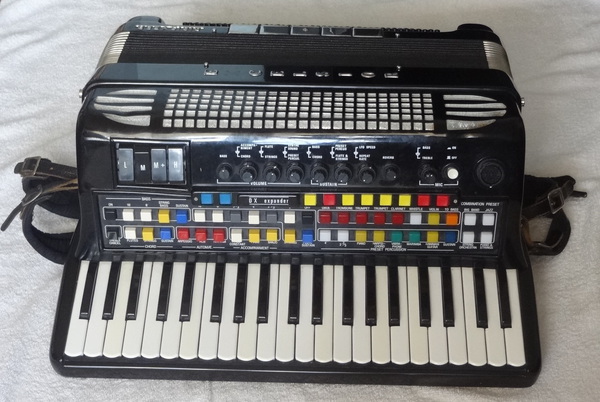Excelsior Digisyzer - Synth Accordion
The "Digisyzer" is a hybrid acoustic synth accordion manufactured by Excelsior around 1982. The treble keyboard has 41 keys, and four reed sets (L, M, M+, and H) which are individually switchable, giving 15 (24-1) different sounds. The bass keyboard has 120 buttons, with four settings: L, M, H and L+M+H.

The Digisyzer also features an electronic synthesizer manufactured by Kawai. The brain of the synthesizer is in a separate "generator" box, but the accordion includes most of what looks like typical organ control panel.
There are a number of sections for independently controlling the sound of the bass, chords, and treble keyboard. This version includes a "DX Expander" module, which adds some additional synth sounds, and allows some additional patching of sounds. For example, the synth sounds which are usually played on the treble keyboard can be patched to the bass chords.
| Section | Controls |
| Bass | On, 16', 8', String Bass, Sustain |
| Chord | Flutes, Strings, Sustain |
| Flute & Strings | 16', 8', 5 1/3', 4', 2 2/3', 2, Strings, Flute Off, Flute Sustain |
| Synthe Sound | Oboe, Trombone, Trumpet, Wow Trumpet, Clarinet, Whistle, Violin, To Bass |
| Preset Percussion | 4', 2 2/3', Piano, Harpsichord, Vibraphone, Marimba, Hawaiian Guitar, Sustain |
| Combination Preset | Big Band, Jazz, String Orchestra, Piano & Strings |
| DX Expander | Vocal Ah, Vocal Uh, Perc to Chord, Synt to Chord, EL Piano, Banjo, Guitar, EL Guitar, Flute, Sax |
The volume of each sound group can be adjusted via control knobs. This includes: Bass, Accompaniment, Chord, Flute, Strings, Synthe sounds, and Preset Percussion. There are separate sustain controls for: Bass, Chords, Preset Percussion and Flute & Strings. Other controls include LFO Speed, Repeat Rate, and Reverb. The Digisyzer also includes microphones for the acoustic treble and bass sounds, and the volume levels can be independently controlled. Like an organ, master volume is controlled via an expression pedal, which also includes to switches for glide and fill-in drum.
Unfortunately, the Digisyzer synth predates MIDI by a year or two, so it can't be used to control external devices. Luckily I also have the schematics, and a cursory examination reveals that it would be fairly easy to design a retrofit that replaces the standard "generator" with a MIDI interface. The accordion unit exposes both keyboards as raw diode matrices via the connector, and an external keyboard scanner could be implemented using a microcontroller.
I scanned the schematics for my own use, and to preserve the original manual. If you need any details, please download it using the link below. I built a microphone adaptor that simply provides 5v power and returns the microphone signal. This allows me to use the built-in microphones independent of the generator box, using the mic ON/OFF switch and Treble/Bass controls. While this works, I am not impressed with the quality of the sound. Due presumably to the placement of the mics, the sound is not very even with pitch. Some notes sound louder than others, and the timbre is not consistent across the range. The behaviour is the same when using the generator box, so it must be related the design of the instrument.
Download Excelsior Digisyzer Service Manual (18Mb)
This accordion belonged to my nonno, Luigi Poggio. He taught himself to play and often performed at dances, RSLs, and pubs. He loved the songs of the 20s, 30s and 40s. Through him I became acquainted with songs like Blue Moon, The Anniverary Song, Five Foot Two Eyes of Blue, Moon River, Alice Blue Gown. For reasons I never understood, his favourite key was Bb.